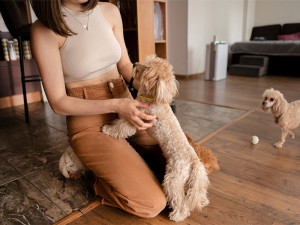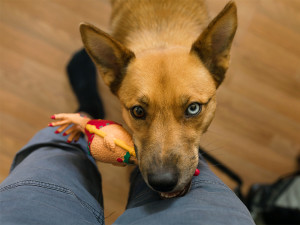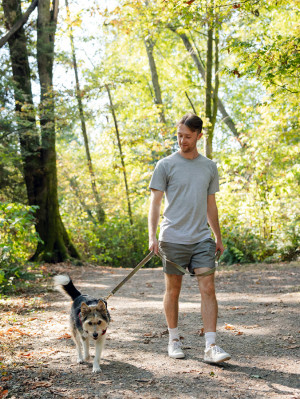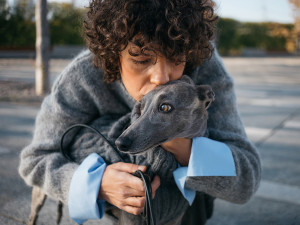Why Does My Dog Follow Me Around?
All the reasons dogs go everywhere we go
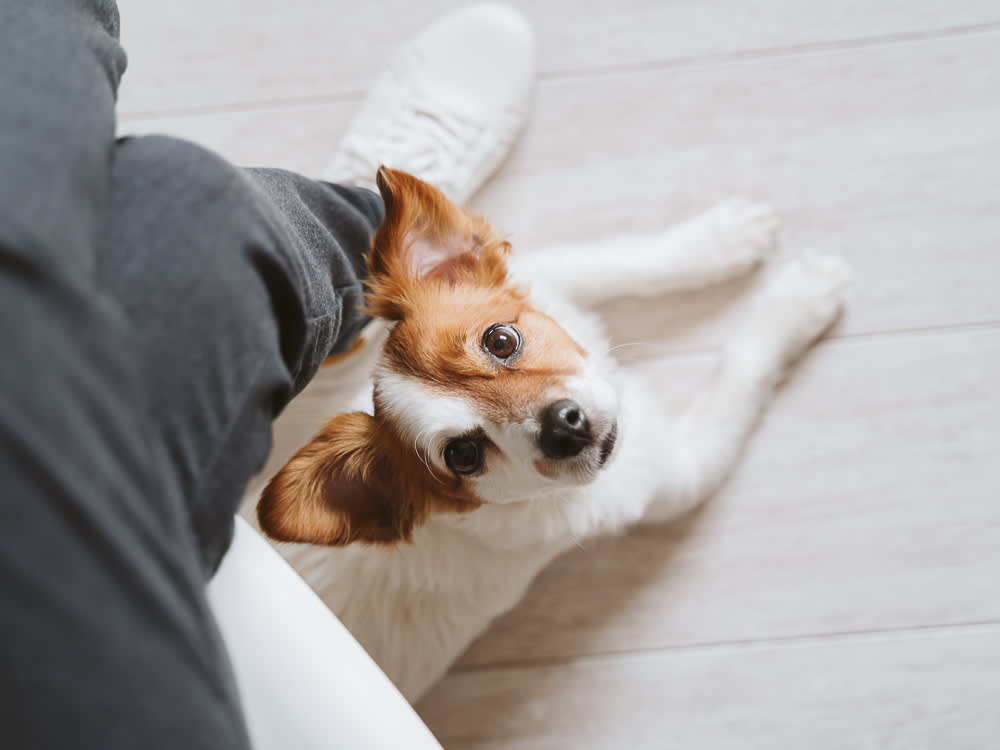
Share Article
Into the bathroom. Under the coversopens in a new tab. Where hasn’t your pup followed you? Dogs are naturally social and tend to like to be around their people, which is why we’re not surprised when they seek out our company. Yet, many dogs have a tendency to follow us so consistently and with such enthusiasm that it raises questions. Generally speaking, it usually means they just want to be around you (and why wouldn't they?). Perhaps the real question is why they want to be around us … and so close! Here are a few reasons dogs follow us wherever we go.
1. Companionship
As mentioned, dogs are social. They form bondsopens in a new tab quickly and deeply with the people in their lives, and they tend to want to stick close to those people. Dogs who constantly follow their humans are displaying their sociability and emotional connection.

littleKin™ is Kinship’s home just for puppy and kitten parents. Bop over to check out expert advice, new pet tools, and special deals—all curated for your newest family member.
opens in a new tab2. Attention
Dogs want our attention. If we move, they follow, perhaps in the hope that their motion will attract our attention. Even the most loved and cared-for dogs who have lots of daily activities will spend a certain amount of time waiting for the next interesting thing to happen. When we get moving, they presumably view our actions as a sign that the attention they seek is about to be bestowed upon them.
3. Hunger
Food! We move when we’re getting ready to feed them (and ourselves). Therefore, many dogs trot along in eager anticipation of getting a meal, or at least a snackopens in a new tab or a little handout.
4. Interest in a walk
Dogs are generally eager to be on the move, so when we’re in motion, they join us. Of course, just walking around the house isn’t their favourite way to get going. Many dogs seem ever-hopeful that when we get up, we’ll head outside for a real walk with them. This is especially true if we head in the direction of the leadopens in a new tab or the door.
5. Worry about being left
Many dogs associate our movement with departures. When we head to the garage, the car or the front door, our dogs may follow along to monitor the situation, seemingly checking to reassure themselves that we’re not leaving or that, if we are, they’ll be going, too.
6. Anxiety
Frequently, dogs who are unable to cope with being left alone opens in a new tabcan’t bear to have us out of their sight. If we leave, they experience a form of panic. Because they’re unable to tolerate being alone, they follow us to be in our constant company and to avoid any separation at all.
7. Boredom
If there is ever a reason why a dog would follow you to the bathroom, it’s boredom. Following us gives them something to do. So many dogs are looking for stimulation of any sort – games, food puzzles,opens in a new tab walks, training… more of anything that fills their days with joy. Perhaps it’s more interesting to accompany us than just to lie there and watch us. Or maybe they’re just curious.
8. Anticipation
Reinforcement drives behaviour, and good things have happened when they’ve followed us in the past – a play session, an outing, a training session or maybe just some petting. If the relationship is a good one, our dogs associate being around us with feeling happy. Many dogs follow their humans because experience has taught them good things happen when they do.

Karen B. London, PhD, CAAB, CPDT-KA
Karen B. London, Ph.D., is a Certified Applied Animal Behaviorist and Certified Professional Dog Trainer who specializes in working with dogs with serious behavioral issues, including aggression, and has also trained other animals including cats, birds, snakes, and insects. She writes the animal column for the Arizona Daily Sun and is an Adjunct Professor in the Department of Biological Sciences at Northern Arizona University. She is the author of six books about training and behavior, including her most recent, Treat Everyone Like a Dog: How a Dog Trainer’s World View Can Improve Your Lifeopens in a new tab.
Related articles
![Dog holding a toy and looking up at their owner]() opens in a new tab
opens in a new tabWhat Is Displacement Behaviour In Dogs?
And should you be worried?
![Man wearing grey T-shirt and shorts with trainers walks alongside his dog on the lead in the woods]() opens in a new tab
opens in a new tabHow to Advocate For Your Dog in Public
How to set boundaries and protect your pup
![a nervous dog sits on a sofa]() opens in a new tab
opens in a new tabBringing Home A Very Nervous Rescue Dog – A Guide For Anxious Parents
At so many points in those first hours, weeks, months, I screamed, internally: what have we done?
![Puppy hides under the couch in fear]() opens in a new tab
opens in a new tabHow to Keep Your Dog From Freaking Out When You Have Company
Do these things to help your pup (and your guests) feel chill
![weird dog rolling in poop]() opens in a new tab
opens in a new tab7 Weird Dog Behaviours Explained
Chasing their tails, eating grass and rolling in rubbish – should you worry?
- opens in a new tab
How to Tell If Your Dog Is a Hugger – Or Not
Boundaries, folks. Boundaries
